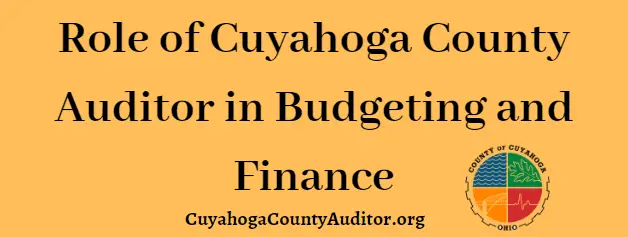In the intricate web of local governance, the role of the Cuyahoga County Auditor stands out as a cornerstone in ensuring financial stability and accountability. Within the framework of county administration, the auditor plays a pivotal role in overseeing budgeting and finance, a responsibility critical for the efficient functioning of public services and infrastructure. Understanding the intricacies of this role unveils the mechanisms through which fiscal prudence is upheld and public trust is maintained.
Responsibilities of the Cuyahoga County Auditor
At the heart of the auditor’s responsibilities lies the assessment of property values. This entails determining the fair market value of properties within the county, a process integral to the calculation of property taxes and subsequent revenue generation. Moreover, the auditor is tasked with overseeing financial transactions, ensuring adherence to established protocols and safeguarding against fraudulent activities. Additionally, the auditor plays a central role in budget preparation and management, working closely with county officials to allocate resources judiciously and in alignment with community needs.
Collaboration with Other County Departments
Effective governance necessitates seamless collaboration between various county departments, and the auditor’s office is no exception. The auditor works hand in hand with the treasurer’s office, ensuring the timely collection and disbursement of funds. Furthermore, coordination with agencies responsible for public services, such as education and healthcare, is imperative to streamline budgetary allocations and optimize resource utilization.
Ensuring Fiscal Transparency and Accountability
Transparency and accountability serve as the bedrock of good governance, and the Cuyahoga County Auditor plays a key role in upholding these principles. Through robust public reporting mechanisms, such as annual financial reports and budget summaries, the auditor ensures that citizens are informed about the allocation and utilization of public funds. Moreover, rigorous auditing and compliance checks serve as safeguards against financial malfeasance, bolstering public trust in the integrity of county governance.
Challenges Faced by the Cuyahoga County Auditor
The role of the Cuyahoga County Auditor is not without its challenges. Economic fluctuations, such as recessions or market downturns, can pose significant hurdles to revenue forecasting and budget planning. Additionally, rapid technological advancements necessitate ongoing investment in digital infrastructure and cybersecurity measures to safeguard financial data and systems.
Strategies for Effective Budgeting and Finance
To navigate these challenges effectively, the auditor’s office must embrace modern tools and technologies that enhance efficiency and accuracy in financial management. Adopting robust budgeting software and data analytics tools can facilitate more precise revenue projections and expenditure tracking. Furthermore, engaging stakeholders through public forums and feedback mechanisms ensures that budgetary decisions are reflective of community priorities and values.
Impact on Local Communities
The role of the Cuyahoga County Auditor extends far beyond financial oversight; it directly impacts the quality of life within local communities. Adequate funding allocation for public services, such as education, healthcare, and infrastructure development, is essential for fostering vibrant and resilient communities. Moreover, targeted investments in economic development initiatives can spur job creation and enhance overall prosperity.
Future Outlook and Trends
Looking ahead, the role of county auditors is expected to evolve in response to changing fiscal landscapes and technological advancements. Anticipated changes in budgeting practices, such as the adoption of performance-based budgeting models and increased emphasis on data-driven decision-making, will require auditors to adapt and innovate to meet the evolving needs of their communities.
Conclusion
In conclusion, the role of the Cuyahoga County Auditor in budgeting and finance is indispensable to the effective functioning of local governance. Through diligent oversight, collaboration with stakeholders, and a commitment to transparency and accountability, auditors ensure that public funds are managed responsibly and in the best interest of the community. As stewards of fiscal integrity, county auditors play a vital role in shaping the economic vitality and well-being of their respective jurisdictions.
